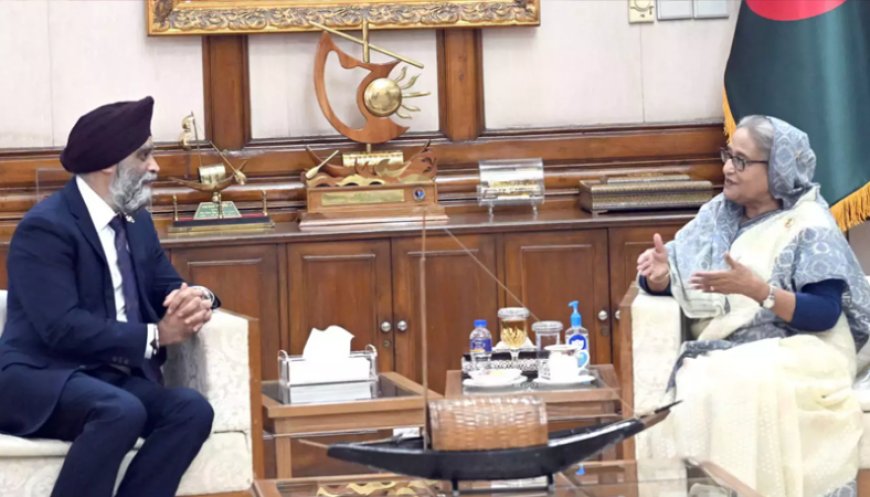Prime Minister calls on Canadian entrepreneurs to invest in Bangladesh
Prime Minister Sheikh Hasina has urged Canadian entrepreneurs to invest in Bangladesh, especially in the agro-processing sector.

He made this call when Canada's International Development Minister Harjit S Sajjan came to pay a courtesy call at Ganabhaban on Friday (February 24). After the meeting, the Prime Minister's speech writer (speech writer) gave this information to the media. Nazrul Islam.
Sheikh Hasina said that 100 special economic zones are being established in Bangladesh. Canadian investors can invest in developing agro-processing industries or any other industry in economic zones.
Sheikh Hasina said her government is emphasizing on development of agro-processing industry to meet local demand as well as export processed food.
Referring to Bangladesh as a small country with a large population, the Prime Minister said her government was trying to significantly increase crop production in a small area to provide food to the local population and to export surplus food or help other countries for food.
He said Bangladesh is successful largely because the country's scientists have been able to develop many high-yielding crop varieties.
The Prime Minister said that there was once a huge amount of uncultivated land in the country, especially in the southern region. These lands have been brought under cultivation due to the development of salinity tolerant varieties, drought tolerant varieties and water tolerant varieties.
The Canadian minister visiting Dhaka said that his country is interested in agricultural cooperation with Bangladesh, especially food preservation and development of small farmers. He praised Bangladesh's development in agriculture and education as well as the development of a large agricultural farm at Ganabhavan Complex, Sheikh Hasina's residence.
Informing the Canadian minister about the government's steps for the development of small farmers, Sheikh Hasina said the government is providing them with subsidies for irrigation, agricultural machinery and agricultural mechanization and is providing assistance to them under many other programmes.
The Prime Minister said that the government has launched a small savings program. Small farmers can save their money under this program and also take loans from it.
He said that for irrigation, the government is now giving importance to rainwater harvesting and surface water use instead of underground water for the sake of nature conservation.
On the Rohingya issue, the Prime Minister sought the cooperation of development partners to repatriate the forcibly displaced Rohingyas to their homeland Myanmar. Seeking help to develop more areas in Noakhali's island Bhasanchar to relocate Rohingyas from Cox's Bazar.
Sheikh Hasina said Bangladesh has built an eco-friendly residence in Bhasanchar with its own funds to provide better living conditions for the Rohingyas. Several Rohingyas have already been shifted to Bhasanchar. He mentioned that more Rohingyas can be shifted from Cox's Bazar if the better living area is expanded there.
The Prime Minister said that some Rohingyas in Cox's Bazar are involved in various crimes like human and drug trafficking and internal conflicts. An inhumane environment has been created there for women especially children and adolescent girls. If they go to Bhasanchar, they will get a fair environment.
Highlighting the issue of climate change, Sheikh Hasina said that Bangladesh is mainly emphasizing adaptation and mitigation to deal with the effects of climate change. The problems caused by climate change are being addressed through local solutions.
He said the government focuses on reducing the loss of life and livelihood during natural calamities. Cyclone Shelter Centres, Cyclone Resilient Houses and Green Belts have been constructed in coastal areas.
Talking about education, the Prime Minister said that her government is giving importance to the development of skilled manpower along with general education to create opportunities for self-employment and increase the flow of remittances by exporting skilled labor to foreign markets.
Prime Minister's Principal Secretary M Tofazzel Hossain Mia, Foreign Secretary Masud Bin Momen and Canada's High Commissioner to Bangladesh Lily Nicholls were present at the time.
What's Your Reaction?











































